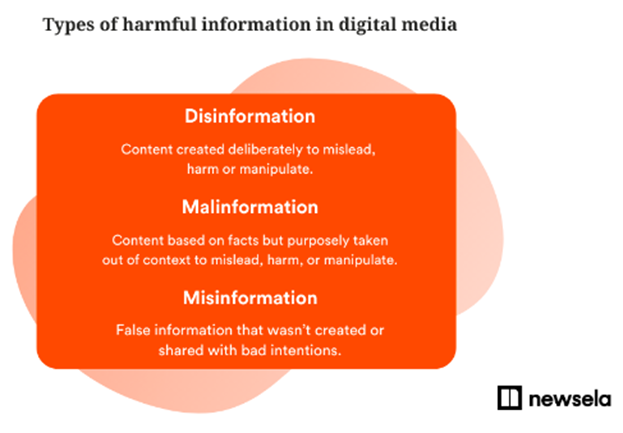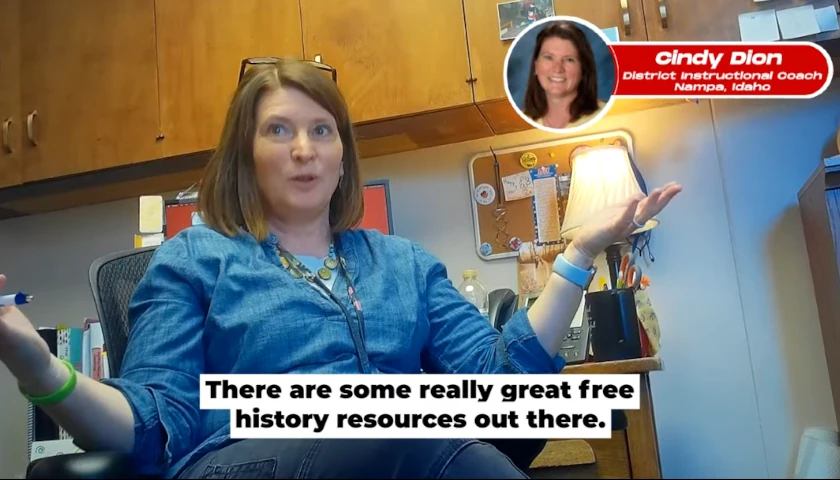by Oscar Buynevich
One of the nation’s largest and fastest growing educational technology platforms, Newsela, is also a foremost provider of “media literacy” lessons for schools. The platform started in 2013 has experienced tremendous growth. Its educational products are used in over 90 percent of schools.
In an educational context, the term “media literacy” is intended to conjure the politically neutral image of educators helping students become more fluent and well-read, but the actual field bears little resemblance to traditional literacy.
Media literacy organizations (including the well-known government-funded media blacklisting organization, NewsGuard), have focused on creating products for educators to teach students not how to read or think critically, but instead teach students what they should read. Media literacy organizations teach which sources and perspectives students ought to trust and which ones should be avoided.
Newsela’s function in the education system revolves around the idea of publishing content from only approved sources. In their own words, Newsela curates material from “trusted sources and makes it instruction ready for ELA, social studies, and science classrooms.” The content from these “trusted” and “vetted” sources is rewritten by their editorial staff to be easily read and interpreted based on a child’s reading level.
These “trusted sources” are exclusively establishment-approved partisan publishers such as The New York Times, Washington Post, Associated Press, and The Guardian. None of Newsela’s over 100 content partners are non-establishment. Even moderate right-of-center outlets like the Wall Street Journal and Fox News are absent.
As detailed in a recent FFO report, Newsela sparked controversy recently due to an undercover investigation by Accuracy in Media, which caught teachers on camera discussing how Newsela could be used to smuggle partisan ideologies like the critical race theory-informed 1619 project into classrooms and teaching assignments against the wishes of parents and state policymakers.
Ramona Bessinger, a Rhode Island teacher who raised concern over a 2023 DHS- funded media literacy program for K-12 teachers hyper focused on Donald Trump, said she first realized the bias and dangers in “media literacy” education in 2021, after she was assigned to teach the subject using Newsela-curated articles.
Undermining the Competition
The practice of demanding that Americans only trust and read establishment-approved news sources not only serves partisan animosity towards ideological rivals, but also financially throttles competitors to a legacy industry.
Legacy media like the New York Times and The Guardian face declining readership due to diminishing trust from the public and competition with non-traditional, decentralized media sources. This creates a strong incentive for the establishment to support organizations like NewsGuard, which financially blacklist competing sources while protecting their legacy media competitors.
As detailed in a February 2024 FFO report, the establishment media has even supported a government-mandated financial bailout for the industry in the form of the Journalism Competition and Preservation Act (JCPA), a bill that would funnel money from Big Tech and disfavored media outlets to the legacy media industry, with decentralized competitors mostly excluded.
The primary lobbying force behind the JCPA is the News Media Alliance. Its board is composed of executives from several mainstream media organizations partnered with Newsela including the Washington Post, New York Times, The Guardian, and the Alliance’s affiliate organization, the American Press Institute (API).
Harnessing the “Disinformation” Panic
Newsela’s earliest foray into media literacy came in 2016 as “fake news” and “disinformation” became a national issue. Through a partnership with the News Media Alliance’s affiliate organization, API, Newsela started an initiative focused on “promoting media literacy” in time for the presidential election.
The announcement from API was originally posted to Newsela’s website in October 2016 and has since been deleted, however it was recovered by FFO:
“We are excited to partner with Newsela to offer a way for teachers to begin some of these thoughtful media literacy discussions with their students. Newsela has created an election Text Set that focuses squarely on media literacy.”
We can’t think of a better time to emphasize media literacy than election season. These resources ensure that any student, no matter his or her reading level, is equipped with the necessary tools to analyze the media and its messages. And once students are better able to evaluate media based on reliability and accuracy, they’ll be able to apply these skills beyond the classroom for years to come.”
After the 2016 elections, when promoting the joint API/Newsela media literacy initiative as an effort to teach students how to identify “fake news,” Newsela’s editor-in-chief Jennifer Coogan said “the onus is on the teacher” to teach kids to sniff out so-called “fake news.” She suggested that this media literacy education should “become the standard.”
Since then, media literacy education has become mandated by law in over a dozen states, including California, Texas, Utah, Delaware, Rhode Island, Illinois, and Florida.
The company has benefited significantly so far from the growth of the media literacy education market, making Deloitte’s list of the top 500 fastest-growing tech companies two years in a row, with 520 percent revenue growth in 2019.
Newsela has been keen on capitalizing on media literacy education laws, actively supporting media literacy education in states like Illinois that enact mandates and marketing their social studies curriculum as a way to complement state-specific learning requirements for media literacy.
It has also provided active support to the “disinformation” panic. In 2020, Neswela joined the ad boycott against Facebook led by the Anti-Defamation League and other pro-censorship organizations:
“As stakeholders in education and news, we stand against the misinformation and consequent polarization that flourishes on Facebook’s platform. It runs counter to everything we stand for as we strive to provide learners with the best instructional content and tools — tools that will serve them well not just in the context of the classroom, but also as citizens who have a stake in each other’s future.”
As pro-censorship organizations stirred up their ad boycott against Facebook, the News Media Alliance saw an opportunity to try to take back profits to mainstream media. They began a concurrent campaign to convince advertisers to turn to legacy media sources instead of having their ads appear next to “disinformation, misinformation, and hate speech” on Facebook.
Influencing Classrooms, Influencing Elections
Aligning with supporting the trend of states increasingly adopting mandated media literacy education, Newsela has been increasingly crafting and packaging election-related educational resources with a focus on pushing media literacy in the classroom.
In January 2022, Newsela’s editor-in-chief, Jennifer Coogan, made “predictions on the future of news.” She said her observations of media organizations were based on the Ad Fontes Media Bias Chart, a resource that controversially gives high grades to NBC, ABC, and CNN for low bias and high reliability, while labeling Fox News and the New York Post as hyper-partisan, unreliable sources. Newsela says that it uses these rigged bias ratings from Ad Fontes when sourcing articles “to ensure that news sources are impartial.”
Coogan lamented the “chilling effect” of school board meetings on introducing mainstream media in the classroom and maintained that those who do not have progressive views had been conditioned to have an aversion to mainstream media. She said that it would be unlikely for “right-of-center sources” to bring balance to the establishment-dominated media industry, and warned that educators needed to have a “level of bravery” to open discussions about news during election season.
While Newsela refrains from partnering with right-of-center content partners for material, Coogan made the point that reliable right-of-center sources are too vastly outnumbered by those on the left to create balanced media. She blamed the distrust of “MSM” by the right and a reliance on “social media and personalized feeds” rather than the media industry’s own aversion to anti-establishment viewpoints on this imbalance.
From “Predictions on the Future of News from Chief Content Officer Jennifer Coogan”:
So long as center-left, fact-based sources grossly outnumber those on the other side, the very notion of news will have a hard time shaking its association with the liberal media. Here’s a prediction: When school resumes next fall, right in time for what promises to be a bruising midterm season, opening any kind of discussion about the news of the day will require a level of bravery more typically associated with test pilots than that of the workaday teacher.
Closer to the election season in August 2022, Newsela announced that they would be embedding “bias and reliability” ratings to certain texts as a part of their media literacy products for the upcoming school year:
“New debate and discussion curations that challenge students to improve media literacy skills, think critically, and create evidence-based arguments. A new special collection provides texts with embedded bias and reliability ratings to help students evaluate what they are reading.”
Newsela additionally created a 2022 Midterm Elections page for educators, with a focus on using the elections as a time to push for students to learn the practice of media literacy:
Engaging with complex policy and social issues is key to developing democratic citizens. We recognize that educators feel unprepared to engage in these discussions — but just need the right resources to confidently broach these issues in a balanced way. The midterm election season is the opportune moment to empower social studies educators to teach civics and media literacy — both comprehensively and thoughtfully.
One of their biggest “key takeaways for educators” in the run up to the 2022 midterms was that Newsela would provide “trustworthy coverage of top election issues.” They assured teachers that their “vetted content” could be used “to broach complex issues in the classroom.” In reality, this “vetted” and “trustworthy” content surrounding top political issues is curated only from their partnering establishment-approved outlets, the same outlets that exclusively espouse establishment-approved narratives.
As part of their 2022 midterm elections resources, Newsela created a free content guide for teachers to use during the run up and aftermath of election day. They marketed media literacy as a part of their social studies material, maintaining that the election season provided an opportunity to introduce students to media literacy.
Engaging with complex policy and social issues is key to developing citizens in a democracy. But, how to do this most effectively can be challenging for many educators. This election season is the perfect time to make real-world connections in the classroom and help students develop the media literacy and historical thinking skills they need to be engaged citizens.
More recently, with the 2024 presidential election just months away, Newsela has been increasing efforts to push educators to teach students which information sources to trust.
Newsela’s white paper, titled “Media Literacy, teach it early, and teach it often,” advocates for a controlled approach to information gathering for students. They encourage teaching students to first narrow down established sources as definitive authorities over the information they seek before doing any preliminary research, rather than going down the rabbit hole and looking up topics in a search engine:
Finding information: Rather than simply typing topics into search engines, students are asked to identify the type of information they need to understand a topic, the sources that can provide that information, and the search strategy needed to curate those sources.
In June 2024 alone, Newsela published three articles advocating for media literacy education:
- “Bring Media Literacy Education to the Classroom” lists “core principles” from The National Association for Media Literacy Education (NAMLE), an organization that has officially partnered with NewsGuard.
- “Teaching Media Literacy: 10 Topics to Cover” encourages teaching students to validate information based on whether the “trusted sources” agree with it.
- Digital Media Literacy: What Teachers Need to Know” links resources from the federal government’s now-notorious censorship sub agency, CISA. They provide controversial DHS definitions for the terms mis-, dis-, mal- information, which are presented as “types of harmful information in digital media.” Newsela implores for educators to teach students “to be aware of these categories of content and what to do if they encounter them while online.”

While Newsela largely has not directly received federal funding like media literacy-oriented censors NewsGuard, they do teach school districts how to accrue federal funding to purchase their educational products.
As states continue to adopt media literacy mandates and the censorship industry’s practice of telling students which news sources they should trust continues, educators will turn to resources like Newsela to expose students to the idea that only the establishment chosen sources and points of view should be trusted.
– – –
Oscar Buynevich is an investigator at the Foundation for Freedom Online.





